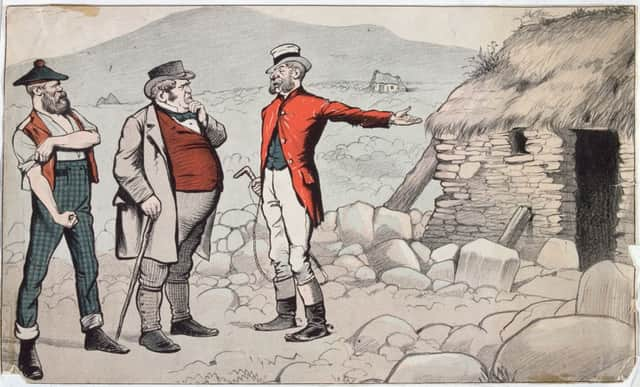Down to earth look at this land of ours


Is treasa tuath na tighearna/The people are mightier than a lord
So rang out the cry in the glens and straths of the Highlands in the 1880s, as small tenants and crofters protested for the protection of their rights during the Highland Land War. Legislation was granted in 1886 but it was far from the end of the story.
Advertisement
Hide AdAdvertisement
Hide AdLand reform is once again high on the political agenda in Scotland in 2015, as a new bill is working through parliament. This attention is nothing new: debates over land reform, what Scotland wants or expects in terms of its landscape, and who is benefiting from this key resource, have been raging for centuries. Despite this, Scotland today has one of the most concentrated patterns of land ownership in Europe, with around 456 individuals owning half of the privately owned land in the country.
It is not only this stark fact that continues to fuel debate over land, but there are competing visions of how land should be used – renewables energies, “wild” land, tourism, sustainable development, rural depopulation, tenant farming, common land. A whole host of issues are attached to land and make it one of the most divisive and controversial issues facing Scotland today. This is not surprising when we consider how vital the related issue of what the Scottish Government is calling community empowerment is – but whose communities, and how might this be mapped out across a country as diverse as Scotland?
Land is a highly politicised issue in Scotland, and so it was felt that a creative and politically neutral forum should be provided to give Scots – and land is an issue which affects all of us – an environment in which to discuss, think, design and plan around land issues. Despite being a dominant issue for centuries, there is surprisingly little research into land issues, and it is for this reason that a new research centre has been established.
The Centre for Scotland’s Land Futures, an interdisciplinary and inter-institutional enterprise run jointly between the universities of Dundee and Stirling, has been established to do just this, and to examine the past, present and future of Scotland’s land issues.
The Centre will bring together perspectives from across the humanities – history, economics, art, English, law and philosophy – in the process helping address a gap in the nation’s knowledge and perception of the use of land.
Up until now there has been comparatively very little research into Scotland’s land use and the history surrounding it, but since it has become a devolved issue it is attracting much greater interest.
We need a Centre like this in Scotland more than any other part of the UK because land use is such a huge political issue, and not just for rural land, it is an urban issue as well. Yet up until now Scotland has been the only part of the UK without such an institution.
The Centre for Scotland’s Land Futures engages with these issues with a wide range of stakeholders from across the political, economic, social and cultural spectrum in Scotland, Britain and Europe. We are based in arts & humanities research and aim to bring an inclusive and diverse approach to land issues. Whether that is in creative practice, historical scholarship or heritage studies, the new Centre takes a broad look at land issues, and aims to be inclusive and progressive.
Advertisement
Hide AdAdvertisement
Hide AdThe Centre aims to operate in three main ways: to conduct interdisciplinary research into land issues, which will include consultation work and contracted research, to support teaching from undergraduate to postgraduate level in order to build a community of scholars and a base of academic scholarship, and to lead a varied and exciting programme of public engagement to secure and enhance public leadership and involvement in land issues.
The Centre helps facilitate creative and academic collaboration among our staff, students, and the wider community, and showcases our innovative work on investigating Scotland’s land issues within a wider British and European context in the past, present and future.
We will organise and host international conferences and lecture series, exhibitions, research seminars, and a wide array of academic, policy-based and creative projects. Working with and developing partnerships with external stakeholders is key to our mission and we would particularly welcome new partnerships across the world.
We need to understand the history of land ownership and use, the issues surrounding it and how it has, and will, influence our culture. The Centre for Scotland’s Land Futures is a considerable step towards that.
• Dr Annie Tindley is senior lecturer in history and director of the Centre for Scotland’s Land Futures at the University of Dundee